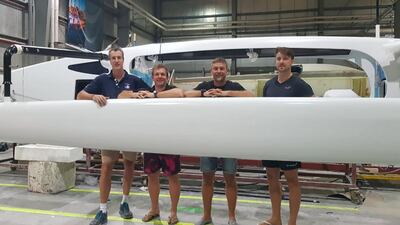Taking to the oars for 14 hours a day over more than 4,250 kilometres does not seem like a wise venture for people who have only just started rowing.
But two of the four men from Dubai who are taking part in the Row4Ocean challenge, across the Atlantic from Africa to South America, are still quite green.
“Everyone in the team has had to learn how to row together, as only myself and Lewis had any experience of rowing,” said Patrick Bol, 52, a container terminal executive with DP World, one of the sponsors of the challenge.
“The other two guys are fast learners and we are confident in their technique. We have been mixing gym strength sessions with specific rowing training on a static machine to build up endurance, rowing 24km every morning.
“When we go outside we have a training boat for long distance rowing around The Palm and The World Islands. We hope to increase understanding of the dangers of plastic in the oceans.”
Bol, a Dutchman, will lead his three British teammates Andrew Ruinoff, Matt Wilds and Lewis Knollman. Knollman has been rowing from the age of 11.
The squad will set off from Senegal, West Africa, in their trimaran on December 14, and hope to complete the journey to Surinam in 27 days.
They aim to break four records, including the fastest Atlantic crossing, with an average speed of more than 3.7 knots.
Other records in their sights are the most consecutive number of days where more than 100 nautical miles are rowed, the first team to row a multihull boat from Senegal to a northern port on South America and the first to cross the Atlantic in under 27 days.
They also want to educate people on the enormously damaging effect of discarded plastic on oceans.
The boat was built at a cost of more than $500,000 (Dh1.8 million) from high-tech materials usually found on Formula One racing cars.
Tough and streamlined, the vessel has been built with speed and efficiency in mind rather than comfort, and the team is aware of the perils ahead.
“We will face the usual threats from the weather, whales, sharks and swordfish that can damage the boat,” Bol said. “This is a particular risk close to the Cape Verde Islands.
“Swordfish have been known to penetrate the hull of boats and flying fish can be a problem if you are out on deck and rowing. As we get closer to South America, there will be a lot of counter currents so we must steer clear of these.
“A lightning mast in the boat will mitigate the risk of any lightning strikes during storms. The boat is made from carbon fibre, which is a good conductor of electricity, so we’ve had to take extra precautions.”
Marine scientists estimate eight billion kilograms of plastic are dumped into the world’s oceans every year – 22 million kg of plastic every day.
The sun breaks down the often bulky waste into microplastics, which fish and other marine life eat. This brings microplastics into the food chain.
_________________
Read more:
Dubai Police learn leadership skills from record-breaking rowers
UAE rower Hamad Al Matrooshi optimistic of UAE's medal chances at Asian Games
Dubai student has tales to tell after completing gruelling Mongol horse race
_____________________
The Row4Ocean team is hoping to make a tangible difference to ocean pollution by supporting a recycling scheme in Karachi and a clean-up operation of the Indus River, one of the most polluted rivers in the world.
Fish caught in Oman and sold to UAE restaurants are likely to have been affected by plastic pollution from the Indus.
“The amount of plastic in the world’s oceans could increase by a factor of 10 in the next decade,” Bol said. “We owe it to ourselves and those who come after us to tackle it now.”





